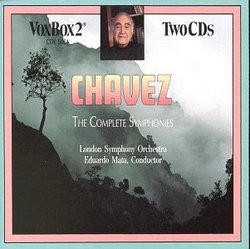| All Artists: Carlos Chavez, Eduardo Mata, London Symphony Orchestra Title: Carlos Chávez: The Complete Symphonies Members Wishing: 0 Total Copies: 0 Label: Vox (Classical) Release Date: 11/4/1992 Genre: Classical Styles: Historical Periods, Modern, 20th, & 21st Century, Symphonies Number of Discs: 2 SwapaCD Credits: 2 UPC: 047163506123 |
Search - Carlos Chavez, Eduardo Mata, London Symphony Orchestra :: Carlos Chávez: The Complete Symphonies
 | Carlos Chavez, Eduardo Mata, London Symphony Orchestra Carlos Chávez: The Complete Symphonies Genre: Classical
|
Larger Image |
CD DetailsSimilarly Requested CDs
|
CD ReviewsDecent performances, really cheap price Evan Wilson | Cambridge, Massachusetts United States | 02/12/2001 (5 out of 5 stars) "Carlos Chavez wrote 6 wonderful symphonies which have struggled to hang on to the fringes of the repertoire. When conductor Mata recorded this set, it was only the second complete rendition of the pieces (after a gritty but imperfectly played set led by the conductor). There has not been another complete set since Mata's so that and the cheap price are good reasons for getting this. The playing and performances are clean and colorful, but I have the feeling that the London orchestra was not completely comfortable with the idiom. There is a certain stiffness and control to their playing which stifles the music a bit. Still, this set warrants 5 stars because we aren't likely to get an new set any time soon.A word about the music itself. Chavez explored Mexican (& Aztec) folk music and the results of that research inform his symphonies to varying extents. The Symphony No. 2 positively revels in the rhythms and sounds of the land, but the folk influence is much more subdued elsewhere. Chavez knew the great 19th century symphonies and his carry on that tradition in a distinctive way. Thus, these pieces use older forms (including a Passacaglia to end the 6th symphony a la Brahms' 4th) and counterpoint abounds. However, Chavez's spare yet original orchestral palette (combining unlikely sonorities) and edgy (but not atonal) harmonic sense rewrite the romantic symphony in a new way. Don't expect the warm, lush sound of Brahms, even in Chavez's so-called Romantic symphony. Instead, expect pieces that meld colorfulness (but not impressionism) with a certain severity. It's an odd mix, but Chavez makes it work and it produces music that is very distinctive.This is very high quality music and it should be in your collection. Still, I hope some enterprising young conductor will take up Chavez's cause soon and give us another cycle (along with recording of Chavez's various concerted works). He deserves to be heard." A Major Symphonic Cycle by a Forgotten Composer Christopher Forbes | Brooklyn,, NY | 02/23/2004 (5 out of 5 stars) "Chavez - Complete SymphoniesFor years I was convinced that I knew exactly what the music of Carlos Chavez would sound like, without hearing a single note. To me it seemed obvious that any Mexican composer would automatically be a nationalist and base most of his music on the folk music of his country. That, plus Chavez's closeness to Copland in the 20s and 30s convinced me that his music would be a rather wan "Mexicana" copy of Copland's more successful Americana material. Then a few years ago I actually listened to the music of this composer and was completely blown away. Chavez was quite simply a brilliant modernist composer who just happened to be Mexican. And a more unjustly neglected composer is hard to imagine.Chavez's six symphonies are a substantial addition to the form in modern times. They are diverse in form and mood and beautifully crafted. Though the composer was primarily self-taught, his command of modal counterpoint and 20th century harmony is impressive in the extreme. Each symphony is distinctive musical entity. The First and Second Symphonies are the shortest works, both in a single compact movement, but that's just about all they share. The First Symphony was developed from material that Chavez has written for a production of Antigone. This is the most uncompromisingly modernist music in the set. The piece is one slow movement, with material based on Greek modes accompanied by tense dissonances. It is austere, but powerfully tragic music. The Second Symphony couldn't be a greater contrast. The Symphony, called the Sinfonia India, is one of the best examples of Chavez's forays into musical nationalism. Based on mestizo music from Chavez's childhood as well as including a massive array of native percussion, this is one of the most impressive and accessible pieces in the composer's repertoire, the only work really that approaches a permanent place in the repertoire. The piece begins with a vibrant melody in wildly changing meters, contrasted with a lovely slower pentatonic melody. The piece has an austere middle section based on a haunting modal melody which climaxes and leads to a repeat of the opening material. Then, the final section of the work accelerates and introduces a new, rollicking theme, which is repeated almost verbatim over and over. The only changes are to the instrumentation, as more and more instruments and a greater battery of percussion drive the work to a rousing finale. The third symphony is the first fairly traditional work in the cycle, written in three movements. The first is a typical sonata allegro with a jaunty main theme. The second is a charming scherzo and the final movement begins as a slow movement, but morphs into a faster finale as it goes. The work is beautifully crafted, as is the one movement 4th symphony, subtitled the Romantic Symphony. The Fifth symphony is almost neoclassical, and scored in two movements for strings alone. The Sixth symphony is also neoclassical, but with romantic overtones. It concludes with a stunning Passacaglia, perhaps the most effective since the Brahms 4th Symphony. It's a wonderful end to a truly impressive symphony cycle.There is almost no competition for the Third, Fifth and Sixth Symphonies. The only other recordings are old vinyl releases with the composer conducting, and they have never made it to CD. The First, Second and Fourth symphony are presented on a competing disc conducted by Enrique Batiz and the State Symphony of Mexico. This latter disc also includes music from Chavez's ballet The Daughter of Colchis and the tone poem Baile, both wonderful works as well. The Second Symphony also appears on a wonderful disc of Latin American music by Leonard Bernstein in the best performance I've heard of the work. Between the Batiz disc and this one by Eduardo Mata the choice is harder. Batiz is a much less inspired conductor than Mata, but his orchestra plays with more color and fire than the LSO under Mata. On the other hand, this Vox set is the only way to get all six symphonies and it IS laughably cheap...you can buy it and still decide to get the Batiz CD later if you wish. Trust me...you'll want that one too, if only for the other Chavez material, because once you discover this unsung composer, I'm sure you'll be wanting more of his wonderful music. I know I do!" Spectacular Aaron Humphrey | Alamosa, CO United States | 05/18/2000 (5 out of 5 stars) "From start to finish these two CDs are simply incredible. Chavez' music is so complex, so emotionally intense that one must make a concerted effort to fully assimilate it. Yet it is work that is well rewarded. This is, simply put, some of the best 20th century orchestral music out there. I most wholeheartedly recommend it."
|

 Track Listings (6) - Disc #1
Track Listings (6) - Disc #1








